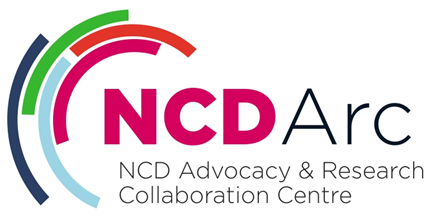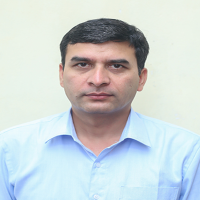Centre at Glance :

“NCDArc – NCD Advocacy and Research Collaboration Centre” is a global centre aiming to promote excellence in education, research and developing contextual strategies for prevention and management of NCDs. The center is expected to establish a network of local, national, and international researchers, academicians, and policy makers and contribute actively in reducing the burden of NCDs. It broadens the arena of research in Non-Communicable Diseases, driven by the passion to promote human health in India and the world at large.
Through multidisciplinary Advanced Research, the centre will be a cornerstone of National Biobanks in maintaining registries for common NCDs. The centre will promote research and responses to non-communicable diseases in low, middle and high-income countries by utilising the power of Data Analysis, evidence-based high-impact interventions and Capacity building for Non-Communicable Diseases through research, public engagement and teaching.
Team

Dr. Deepak B. Saxena; MD, PhD, Post Doc
Director, Indian Institute of Public Health Gandhinagar

Dr. Komal Shah, Post Doc PhD.
Centre Lead and Associate Professor, Indian Institute of Public Health Gandhinagar
Collaborator

Prof. Sanjay Kinra,
MBBS MD MRCP MSc PhD FFPH Professor HOD Non-Communicable Disease Epidemiology, London School of Hygiene and Tropical Medicine

Dr. Banshi Saboo
MBBS, MD, DNB PhD President, RSSDI Chief Diabetologist & Chairman of Diabetes Care & Hormone Clinic - Dia Care, Ahmedabad

Biraj Karmacharya
MSc, PhD, MPH Director, Public Health /Community Programs/Global Engagement Dhulikhel Hospital Kathmandu University Hospital

Dr. Kamal Sharma
Interventional Cardiologist, Ahmedabad, India

Dr. Bhumika TV
Director General, Campbell South Asia

Namraj Dhami
MSc, PhD Associate Professor & Executive Director, Pokhara University Research Centre.

Dr. Harsh Shah
MDS, PhD Professor, Head of the Department of Public Health Dentistry

Dr. Tulsi Mahadevia
MDS, Trustee of the IGNITE Foundation

Dr. Radhika Arunkumar
Research Program Manager CRE in Digital Technology to Transform Chronic Disease Outcomes I Implementation Science Lecturer - Public Health Leadership and Management Melbourne School of Population and Global Health University of Melbourne
Research Team












Why NCDs?
Non-Communicable Diseases (NCDs) represent a critical and growing global health challenge. These diseases, often referred to as chronic diseases, are not transmitted from person to person and typically have long-lasting or lifelong impacts. NCDs encompass a wide range of conditions, including heart disease, cancer, diabetes, respiratory diseases, and mental health disorders.
Enormous Global Burden: NCDs are responsible for a significant portion of the global disease burden. They are the leading cause of death worldwide, accounting for approximately 71% of all deaths. This staggering statistic highlights the urgent need to address these diseases.
Economic Impact: NCDs not only affect individuals and families but also have a substantial economic impact. The costs associated with NCDs, including healthcare expenses and lost productivity, place a heavy burden on individuals, communities, and healthcare systems.
Preventable and Modifiable: One of the key reasons to focus on NCDs is that many of them are preventable and modifiable through lifestyle changes, early detection, and timely interventions. By addressing risk factors such as smoking, poor diet, lack of physical activity, and excessive alcohol consumption, we can significantly reduce the incidence of NCDs.
Health Equity: NCDs disproportionately affect vulnerable populations and contribute to health disparities. Addressing NCDs is essential for promoting health equity and ensuring that everyone has the opportunity to lead a healthy life, regardless of their socio-economic status or geographic location.
Long-Term Impact: NCDs are often chronic conditions that can lead to long-term disability and reduced quality of life. By focusing on NCD prevention and management, we can help people live healthier, more fulfilling lives.
Sustainable Development: NCDs are closely linked to the Sustainable Development Goals (SDGs) set by the United Nations. Reducing the burden of NCDs is essential for achieving several SDGs related to health, poverty reduction, and well-being.
Addressing NCDs is not just a matter of public health; it’s a matter of global importance. By understanding the significance of NCDs and acting to prevent and manage them, we can improve the well-being of individuals and communities around the world, reduce healthcare costs, and promote a healthier, more equitable future for all.
Ongoing Projects on NCDs:
| Sr No. | Title of Project | Funding Agency | Year of Sanction & Duration |
|---|---|---|---|
| 1 | Non-laboratory tool for CVD risk screening – Indian Non-Laboratory Heart Study (INHAS) | Department of Health Research | 2021 |
| 2 | Non-laboratory-based Screening for risk assessment of cardiovascular diseases and interventional strategies for identified risk groups- A “NIVARAN” | The Hans Foundation | 2022 |
| 3 | Effect of Intermittent fasting on weight loss: A short- term Randomized Controlled Trial | ICMR | 2021 |
| 4 | Enhancing Community Health Meghalaya through WHO’s PEN program for CVDs and Metabolic Wellness” | WHO | 2023 |